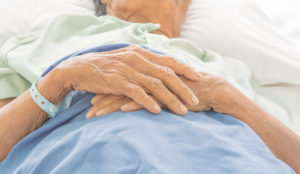Call today and speak to Jason Brady, specialist medical negligence solicitor. Find out if you can claim compensation.
CALL 0800 083 5500
It has been well documented how the winter months can be the most testing for the NHS but recent figures suggest the NHS has been tested to the brink with over 480,000 people calling NHS 111 in the week ending 31st December. This represents a 21% increase compared to the previous week.
 However, further figures released earlier this month have stated that January 2018 was the second-worst month on record for NHS A&E departments, with 1,043 patients waiting over 12 hours from the decision to admit to admission. Additionally, only 77.1% of patients were dealt within four hours in January – significantly below the 95% target.
However, further figures released earlier this month have stated that January 2018 was the second-worst month on record for NHS A&E departments, with 1,043 patients waiting over 12 hours from the decision to admit to admission. Additionally, only 77.1% of patients were dealt within four hours in January – significantly below the 95% target.
Delays are thought to have arisen for a number of reasons: the cooler weather means levels of certain illnesses such as flu peak, leading to increased demand for various services. However, the delays can have significant implications for those suffering with the most severe symptoms who typically experience longer waits in order to be seen and treated. These delays can lead to increased suffering and a delayed diagnosis before initial treatment begins, in which instances the patient may be entitled to pursue a delayed diagnosis claim as part of a wider medical negligence claim.
The latest figures released by the NHS also revealed that those attending A&E via ambulance have also had to endure longer waiting times. In many instances patients had to wait in the back of an ambulance before being handed over to A&E staff – 138,463 patients have been subjected to waits of 30 minutes in either an ambulance or hospital corridor. Of those patients, 31,306 had to wait at least an hour. In instances where patients are experiencing extensive delays before treatment concerns have been raised over the impact on the overall quality of care. Furthermore, there have been reports of ambulances being unable to attend to patients due to the delays in handing over their current patients. These situations may lead to an increase in the number of patients pursuing a hospital negligence claim should their care have suffered as a result of the delays.
These alarming figures are the latest indication of the immense pressure that the NHS continues to be under during the winter months.
Commenting on the figures, Professor John Appleby, Chief economist at the Nuffield Trust health thinktank stated:
“Today’s figures provide hard evidence on just how bad a winter the NHS is having: over 80,000 patients waited on trolleys for more than four hours at A&E in January, of whom over 1,000 were waiting for over 12 hours. These are the highest numbers since records began”.